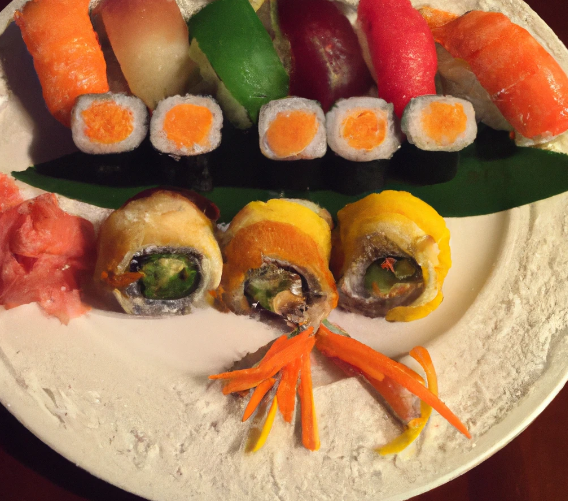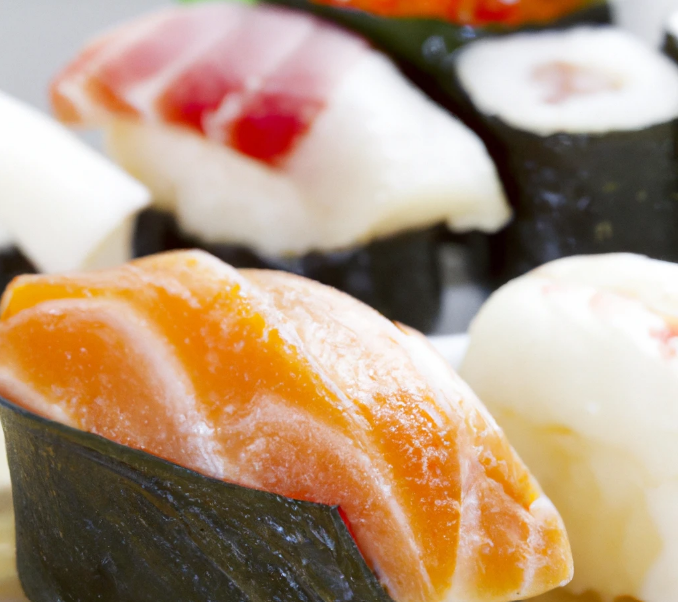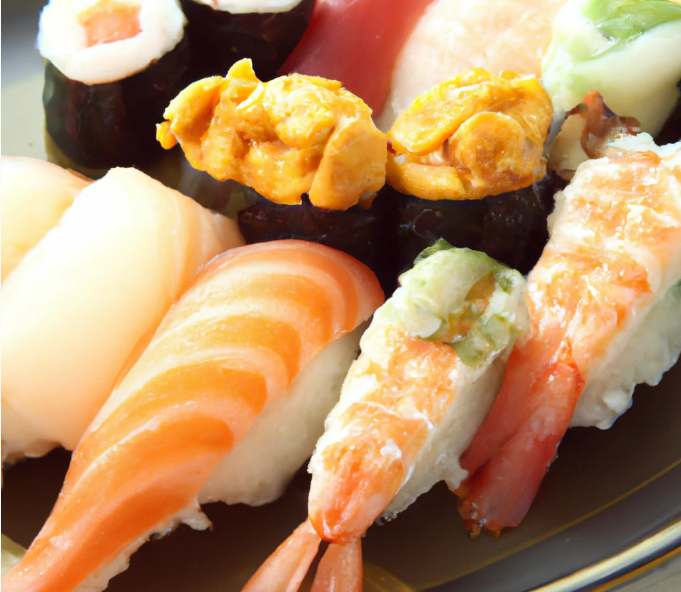Sushi is a popular food among tourists to Japan, and for those with dietary concerns, there are several vegetarian and vegan sushi options. What type of sushi is vegetarian? Read on to see!
Nigiri-style Vegan Sushi
Nigiri sushi is the most popular variety of sushi as it is known today. A ball of vinegared rice is formed into a little log by the sushi chef. Without the use of weighing scales, sushi chefs can produce these accurate measurements by hand.
Mushroom Nigiri with Shiitake
Shiitake mushrooms are a particular variety with a powerful, savory flavor that is frequently dried for use in soup stock. When used in sushi, the mushrooms are often lightly flamed and lightly seasoned with salt or soy sauce to improve the flavor.
Nasu Nigiri
Nasu Nigiri is eggplant-based sushi that can be pickled for a chewier texture or grilled for a mouth-melting softness. Another well-liked variation of this sushi is served with tempura eggplant and is frequently accompanied by grated ginger.
Avocado Nigiri
A common ingredient in many various types of sushi is avocado, sometimes known as the “butter of the forest.” If the rice is served in nigiri form, an avocado slice is placed on top. The avocado slice is normally mildly salted and secured with a thin strip of nori seaweed.
Tamagoyaki Nigiri
Tamagoyaki nigiri is a rice ball with an omelet slice on top that is frequently encased in a thin seaweed belt. It’s a good idea to ask if dashi has been put on the omelet, and some eateries might be willing to create the tamagoyaki sushi for you without dashi if you ask.
Kappa Maki
With a slice of cucumber wrapped in a delicate roll of rice and seaweed, the kappa maki-cucumber roll is a good choice for vegetarians and vegans who enjoy sushi. For frequent sushi diners, this is a well-liked beginning or palette cleanser.
Can You Eat Sushi If You Are A Vegetarian?

Vegetarianism isn’t just a matter of food choices. It’s a lifestyle. When we talk about being a vegetarian, we mean that we don’t eat meat, fish or poultry. There are many reasons to be a vegetarian. The primary one is that eating meat causes harm to animals, their health and the environment.
For example, animals are raised in crowded conditions with no access to sunlight, fresh air or space to move. That can lead to diseases. But there are lots of other reasons to be a vegetarian. Some people choose to be vegetarians because they believe that human beings are a higher form of life than animals. Others consider themselves to be spiritual and follow the principles of nonviolence. Still others want to respect the earth and the natural world.
In any case, most vegetarians don’t eat sushi. And that’s a good thing. Here are some reasons why…
Vegetarians don’t eat fish. Fish are the flesh of animals, including crustaceans, amphibians, birds and reptiles. Fish are raised in close quarters and aren’t given a lot of exercise. Their diets are limited and they are fed growth hormones. Many types of fish contain high levels of mercury and other pollutants that affect the brain and kidneys.
Fish are eaten at thousands of restaurants worldwide. This is why so many vegetarians choose to avoid eating fish. A common belief is that fish are low in cholesterol, and this is true. However, research shows that eating fish can have health benefits. Eating fish that has a low mercury content is better for the brain. It may also lower the risk of heart disease and cancer.
And that’s just the tip of the iceberg.
There are a lot of fish with a higher level of mercury and many other pollutants that cause problems for the brain and kidneys.
Many vegetarians also don’t eat red meat.
Meat is a large source of protein. The protein from beef, pork, lamb, veal and goat can replace the protein in eggs and dairy. That means you could have eggs and cheese without consuming any red meat. The reason people eat less meat is mostly because they don’t want to eat it.
And the fact that many vegetarians choose to avoid eating red meat is a great step towards a more sustainable future. Most vegetarians don’t eat sushi. And that’s a good thing. By understanding the reasons to be a vegetarian, you’ll be better able to make an informed choice about whether to become a vegetarian.
What kind of sushi do vegetarians eat?
A vegetarian is someone who eats no meat. While the diet isn’t difficult, it can be tricky to meet the daily requirement of protein. Protein provides building blocks for muscle, and vegans tend to get their protein from soybeans. This is why vegetarians are often concerned about choosing the right sushi options.
For those who are concerned about their protein intake, here are some tips for choosing a satisfying sushi meal: Try sushi that features vegetables. These include tuna, cucumber and avocado Be careful when choosing shrimp as a topping, because the seafood is often heavily flavored. A better choice is unagi (freshwater eel), which adds a mild flavor to a meal.
If you want to enjoy a healthy sushi meal, don’t skip the seaweed. There are lots of choices and the seaweed adds a great texture and flavor to a meal. Sushi made with brown rice tends to be less salty than white rice. Vegetarians have some unique dietary requirements. If you’re trying to stick to a vegan or vegetarian diet, it’s important to know about the food choices available to you.


